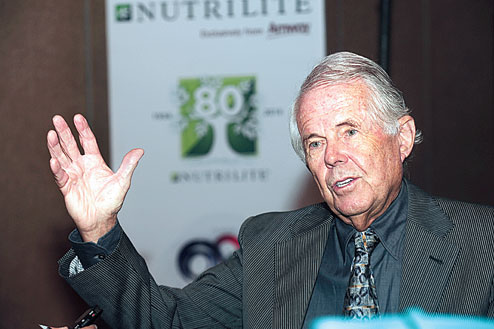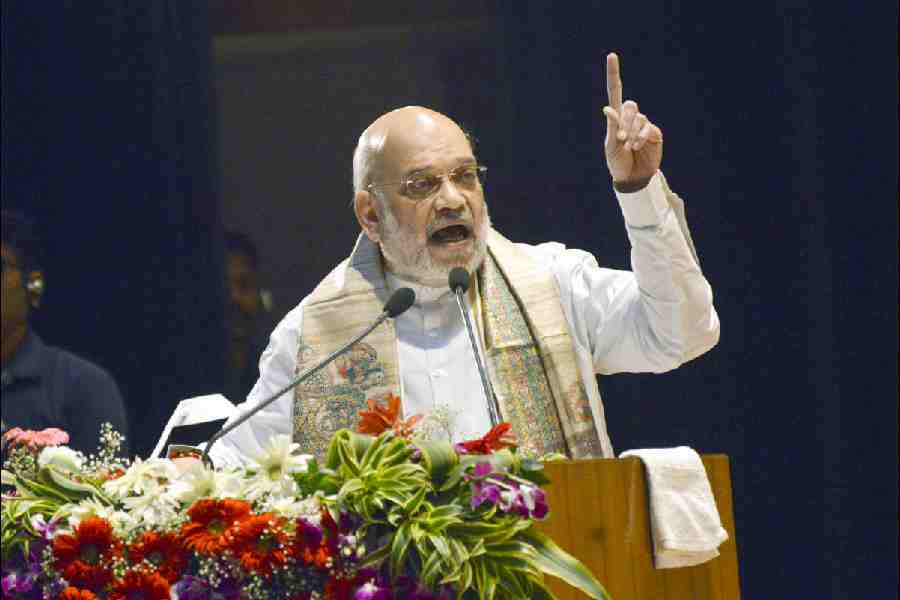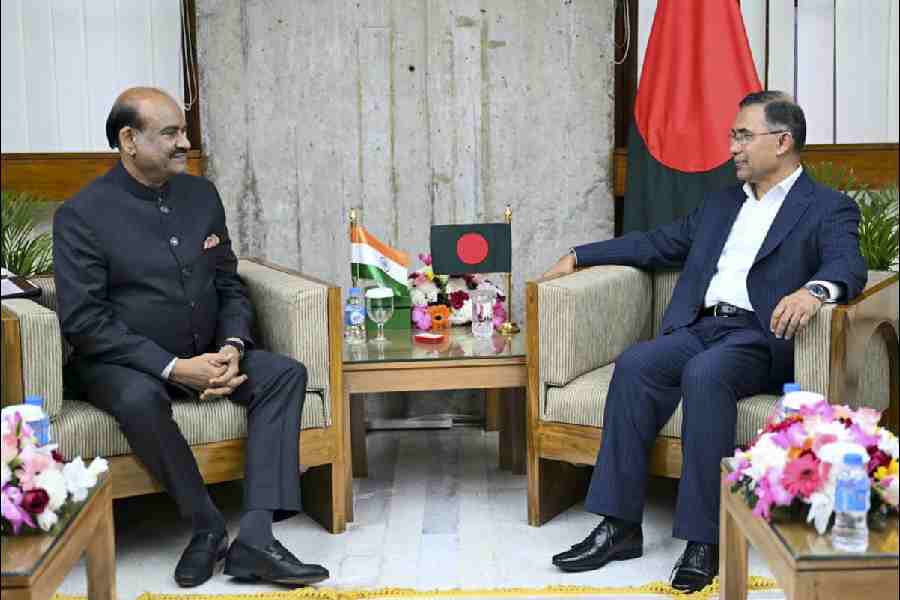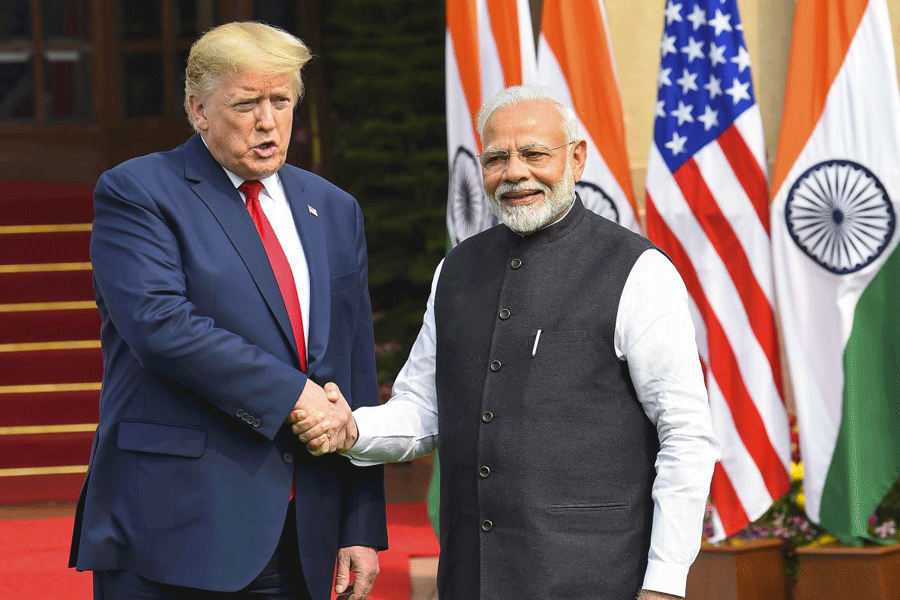
Sam Rehnborg at The Lalit Great Eastern during his February visit.
Picture: Pabitra Das
I had met Dr Sam Rehnborg four years ago in California and was amazed to see how young he looked for his chronological age. But this time when I got to see him again, I was floored not only by his age-defying prowess but by his ability to beat jet lag to look fresh and dapper to launch his plant-based protein powder in Calcutta. It won’t come very easy to any 79-year-old but not so for him, because as he likes to say he has “been eating Nutrilite vitamins and food supplements longer than anyone else”, being the son of Nutrilite founder Carl F. Rehnborg and currently the president of Nutrilite Health Institute, California. Here are excerpts from our chat...
Is this your first trip to India?
No, I came to Calcutta 50 years ago before you were even born. I remember having stayed at the Salvation Army Hostel way back then. I am in love with Calcutta and the food at Oberoi (Grand) is great. Everything here made me nostalgic. We are celebrating the 80th anniversary of Nutrilite this year.
So, what change have you noticed in India?
Well, I didn’t see many stomachs (read: belly fat) way back then.
Is this your first visit to promote Nutrilite in India?
Yes, when I first came to India, I was in college. Fifty years back, I was young and I travelled alone. This is the first time that I’m here to promote Nutrilite seriously. Now, you should come to our NHI again (Hena had visited the Nutrilite Health Institute in 2011). It has a bigger research team and 900 scientists are working with us, out of which over 100 have done their PhD. There are 75 laboratories operational. Major laboratories are in California, Michigan, State of Washington and in Asia we have major research centres in Shanghai, China.
Food supplements are getting popular but many from the medical fraternity and even dietitians are of the opinion that you get all your nutrients from food...
Yes, true. Our approach and our message is the same. My father used to say that the best thing is if you get the nutrition from food. But when we go back and survey to find out what the people across the globe are doing, we find that they are not deriving nutrition from the food. The scientists of NHI found that people don’t have that kind of diet. World Health Organization recommends that you need to consume minimum five servings of fruits and vegetables every day, keeping the variety, but nearly 75 per cent people are not consuming the required. For India, the figures are 85 per cent.
India, particularly, is suffering from a lot of problems. Indians are denied air and water free from pollutants and this pollution is a major hindrance to optimal nutrition. There is no soil management, the soil is depleting of vitamins and nutrients fast. Indians should do sustainable farming.
Do you have any plan for sustainable farming in India?
Yes, it is our dream to plan such farming in India. In India, we are coming with our Greenfield manufacturing facility in Madurai. We have 50 acres for a manufacturing facility and out of this, 25 acres is earmarked for manufacturing and 25 acres for biodiversity planning. Our dream is to establish a botanical research centre there. We can demonstrate to the people what sustainable organic farming is all about, so people can do it in their own areas.
When it comes to supplements, people are scared to take them. What would you say to them?
In my opinion, we should first educate them about the optimal diet and advise that if you don’t get that diet, there is a food supplement — it is not a drug, it is food — that you can incorporate in your diet. I have been consuming it for 79 years myself, twice a day and I am fit and fine and a living example of it.
What is your take on personalised nutrition — nutrigenomics?
I am very excited about the vast possibilities.
As far as I understand, nutrigenomics is all about predicting diseases, but don’t you think this will create fear if people are told they may suffer from a disease in the future?
I don’t think so. If you know you might get a problem with cholesterol, vitamin D deficiency etc, you can address, postpone or even prevent that disease.
ON SUPPLEMENTS:
If you don’t get the optimal diet, there is a food supplement — it is not a drug, it is food — that you can incorporate in your diet. I have been consuming it for 79 years myself, twice a day and I am fit and fine
Can we do it here in India?
You are probably ready but lots of approvals are required here in India. One of our scientific advisory board members heads the Centre of Nutrition & Genetics at Washington DC. It is her vision and mine that one day we will have genetic testing centres all over the world. And we can tell people, ‘Hey, you are more prone to this and this is how you can change it’.
In India, cancer has garnered epidemic proportions. How can Nutrilite help in preventing cancer?
We know cancer is caused by nutritional problems. We don’t know specifically what causes this problem. Nutrilite supports research in identifying this. We are engaged in research on disease prevention and have collaborated with universities too. Personalised nutrition is another step to prevent diseases.
Dr Jack Boyer was a leading cardiologist in the late ’60s, he focused on prevention of disease. At that time, when rest was considered good medicine for a person with cardiovascular disease, Jack Boyer wrote a different prescription — exercise. The new approach, which bordered on radical nearly 50 years ago, was a major contribution to advancements in the prevention and treatment of heart disease. We spend billions of dollars in healthcare but very little on disease prevention. If healthcare expenditure is cut through disease prevention, it can help in progress and development of a country and it is quite relevant for a country like India.
What’s your take on Ayurveda?
Though my father’s original ideas on the importance of supplements were formed in China, he was also influenced by Ayurveda and India. The central idea was to emphasise a holistic approach instead of just identifying germs.
Herbal and other dietary ‘supplements’ have always been a part of the Chinese diet. My father realised they were healthier because their diets were more complete. Intrigued by the Chinese herbal centres, my father started researching ways to create a supplement to add to a deficient diet; a sort of nutritional insurance. That is how Nutrilite was founded in 1934. The original supplement he created aimed to give you a complete balance: vitamins, minerals, trace elements and phytonutrients. People living in big cities today tend to live on a diet of processed food that is deficient in necessary vitamins and minerals..
A study has shown that Indians consume more sugar. Most Indians consume less protein, specially vegetarians. How can Nutrilite help us?
We had a protein in the market for a long time. We just introduced a plant-based one so that vegetarians can consume that. We have created a plant-based protein powder that provides all of the essential amino acids people need in their diets to maintain cellular health throughout their body. It provides additional benefits of phytonutrients like soy isoflavones, which are known to have antioxidant properties. It is cholesterol-free, with no added sugar, and lactose-free.
Finally, how do you keep fit at 79?
A well-balanced diet and good protein is the answer. Life follows a curve and good nutrition and exercise is the best you can do to have a good quality of life. My wife Francesca is Italian and she is a great cook. We cook together. For my wife and me, one hour of exercise every day is a must. My wife focuses more on weight training and Pilates.
Do you have a question for Sam Rehnborg? Ask t2@abp.in











